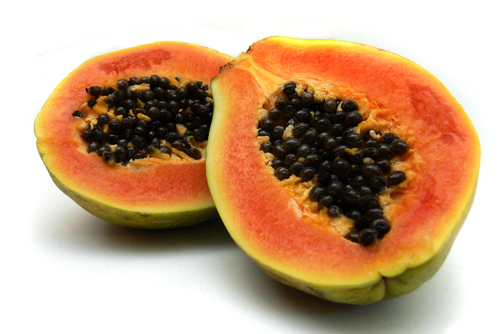Papaya Nutrient Packed
The health benefits of fruits and vegetables can not be equated to that promised by nutritional pills and supplements. Nutrition experts advocate generous intake of fruits for optimum health as these food items are loaded with all the benefits. Fruits are goldmine of vitamins, minerals and fibre and are ideal to consume at least 4-5 servings in a day. Since they are in the natural form, account for largest part of water and 100% bad cholesterol free, it’s much easier for the body to process and absorb the vitamins and minerals from the fresh fruit.
Yellow and orange fruits and vegetables contain varying amounts of antioxidants such as vitamin C as well as carotenoids and bioflavonoids, two classes of phytochemicals that scientists are studying extensively for their health-promoting potential. In addition, a new scientific base is emerging to support a protective role for this group of fruits and vegetables in prevention of cataract formation, chronic obstructive pulmonary disease, diverticulosis, and possibly, hypertension.
“Papaya” is recommended to be one such pick from the group of Yellow and orange fruits, which promises abundant health benefits. It is a melon like fruit with yellow- orange flesh with dozens of small black seeds enclosed in skin that ranges in color from green to orange. Papaya has high nutritional benefits. It is rich in Anti-oxidants, the B vitamins, folate and pantothenic acid; and the minerals, potassium and magnesium; and fiber. Together, “these nutrients promote the health of the cardiovascular system and also provide protection against colon cancer.” In addition, papaya contains the digestive enzyme, papain, which is used like bromelain, a similar enzyme found in pineapple, to treat sports injuries, other causes of trauma, and allergies. Vitamin C and vitamin A, which is made in the body from the beta-carotene in papaya, are both needed for the proper function of a healthy immune system. Papaya may therefore be a healthy fruit choice for preventing such illnesses as recurrent ear infections, colds and flu.
This highly loved tropical fruit was reputably called “The Fruit of the Angels” by Christopher Columbus. In the 20th century, papayas were brought to the United States and have been cultivated in Hawaii, the major U.S. producer since the 1920s. Today, the largest commercial producers of papayas include the United States, Mexico and Puerto Rico.
Gluten refers to a group of proteins that are difficult for humans to digest. One group of proteins called gliadin is thought to do most of the damage to the intestinal lining. Glutenins are another group of proteins found in gluten and thought to be associated with autoimmune skin diseases and asthma. Gluten proteins are extremely resistant to intestinal digestion, despite grinding, cooking, processing and digestion.
•Papaya contains the digestive enzyme papain and therefore valuable for aiding digestion.
•The unique protein-digesting enzymes; papain and chymopapain have been shown to help lower inflammation and to improve healing from burns in addition to helping in digestion of proteins. The antioxidant nutrients found in papaya, including vitamin C, vitamin E, and beta-carotene, are also very good at reducing inflammation.
•The ripe fruit is easily digestible and prevents constipation.
•Case studies indicate that this food taken alone for two or three days has a highly beneficial tonic effect upon the stomach and intestines.
•The juice of the papaya aids in relieving infections of the colon and has a tendency to break down pus and mucus reached by the juice.
• May help prevent cancer in organs and glands with epithelial tissue (ripe papaya). Papaya’s fiber is able to bind to cancer-causing toxins in the colon and keep them away from the healthy colon cells. In addition, papaya’s folate, vitamin C, beta-carotene, and vitamin E have each been associated with a reduced risk of colon cancer
• Prevents nausea (includes morning sickness and motion sickness)
• The seeds are antihelmintic, for expelling worms and they are given with honey. Chew and swallow two teaspoonfuls of seeds after each principal meal (three times a day).
•Papayas may be very helpful for the prevention of atherosclerosis and diabetic heart disease. Papayas are an excellent source of vitamin C as well as a good source of vitamin E and vitamin A (through their concentration of pro-vitamin A carotenoid phytonutrients), three very powerful antioxidants.
• Papayas are also a good source of fiber, which has been shown to lower high cholesterol levels.



